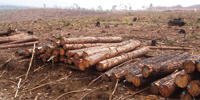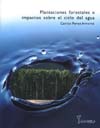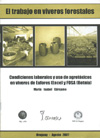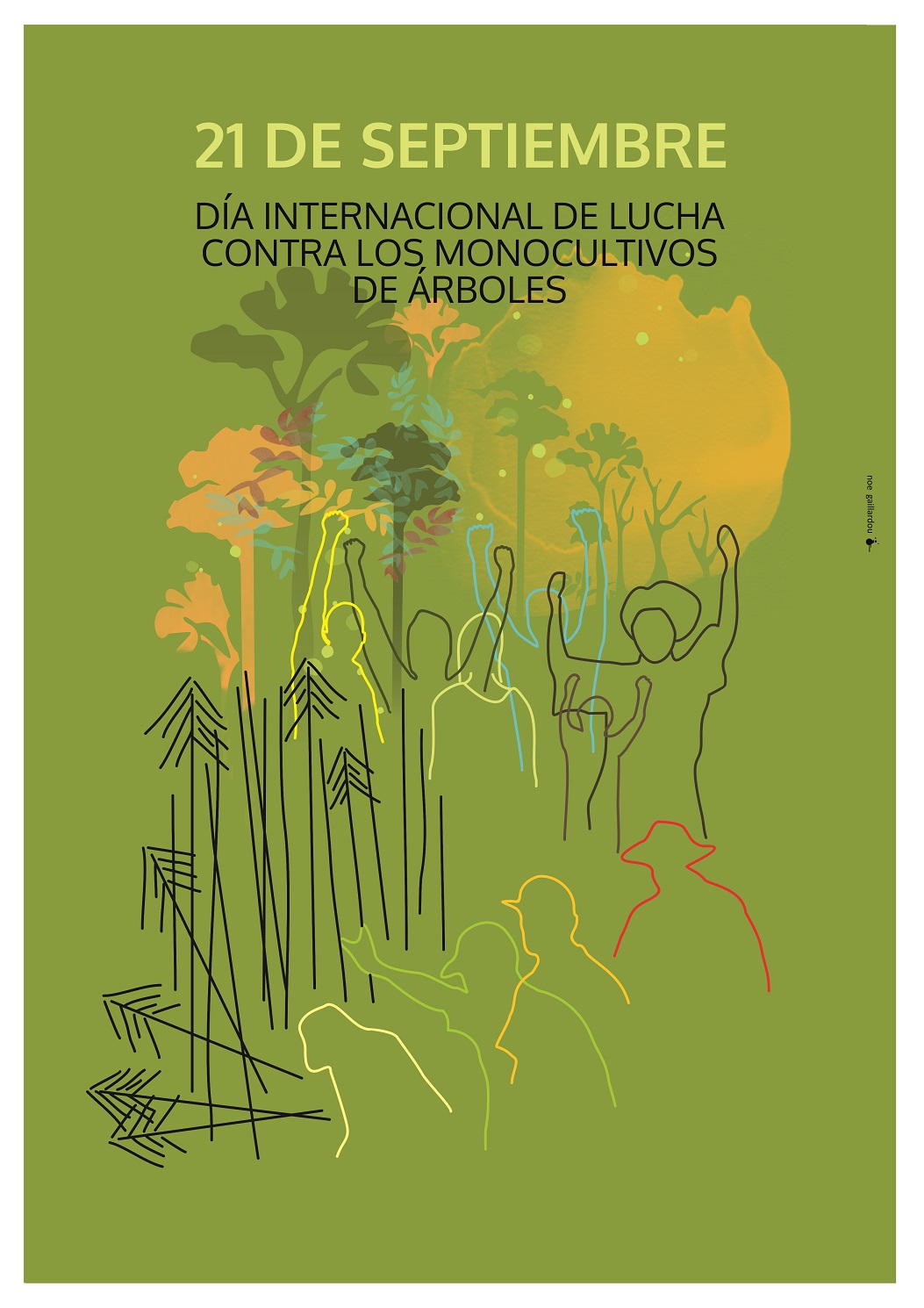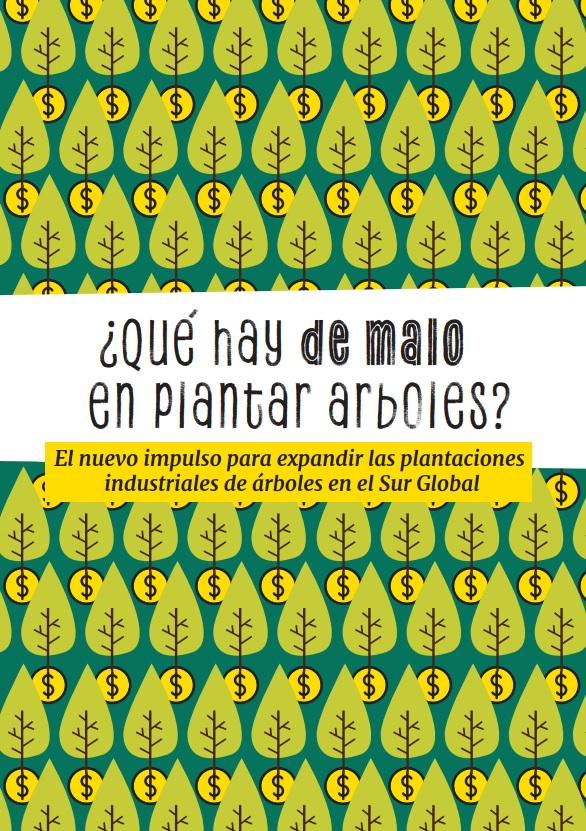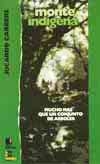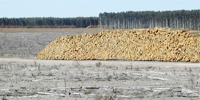Consumerism and poverty are the two extremes of the current world paper market. Manipulation of markets, cartel agreements, establishment of prices and other similar practices give a group of companies the necessary power to control it. In between are pollution of air, water and soil, land accumulation and appropriation by foreign companies, scale increases and strengthening of a form of production requiring fewer and fewer workers. A chain of unsustainable actions in this line –a replication of others– that sets aside any sensitivity and prudence towards nature and the present and coming generations. Social equity is not in the sights of these enterprises.
Since 1989 the Uruguayan State has become indebted with the World Bank to support a forestry model exporting eucalyptus logs for pulp. It did so with the concession of tax exemptions, partial refund of plantation costs, soft credits, construction of highway facilities, equal benefits for foreign investment, among others. As a result, Uruguayan society made a contribution of approximately 400 million dollars to the plantation sector.
However, tree plantations did not bring with them the promised jobs. They contributed to rural emigration insofar as they generated fewer permanent jobs than extensive cattle-raising, while doing so at the cost of jobs lost in the activities they substituted, with equal or less quality of working conditions and lower salaries.
Nevertheless, all these considerations do not appear in the companies’ book-keeping or in the book-keeping of the international financial institutions or of the governments responding to their instructions. They only discuss in the language of orthodox economy and “global demand” and not in the language of small rural farmers, of workers or of politics. The result was that tree planting went on.
In addition to destroying prairies and the few remnants of indigenous forests in the hilly area, large scale tree plantations increased concentration of land tenure and foreign ownership of land. In the 1960s, there was a strong public demand for agrarian reform. At that time, the greatest landholdings in private hands were of about 30,000 hectares. Today, the US based forestry company Weyerhaeuser concentrates some 150,000 hectares of land. There are also Canadian and Chilean capitals that have purchased thousands of hectares for tree plantations. EUFORES, belonging to the Spanish ENCE group has some 50,000 hectares planted with eucalyptus aimed at pulp production. The Forestal Oriental Company (FOSA), belonging to the Finnish capitals of Botnia and UPM/Kymmene, owns some 100,000 hectares, of which 60,000 are declared as intended for tree plantations.
In 2003 the two latter companies submitted projects for the installation of two mills to produce bleached pulp from eucalyptus, a few kilometres away from the city of Fray Bentos and the “Las Cañas” tourist resort. ENCE plans to install a mill with the capacity to produce 500,000 tons per year and Botnia a mill with the capacity to produce one million tons per year.
Resistance to these mega-enterprises has been increasing (see WRM bulletins nos. 12, 54, 75 and 83) involving not only Uruguay but also the neighbouring Argentine province of Entre Rios, which would be affected by the impacts of both mills.
Members of Guayubira –one of the Uruguayan groups that has strongly questioned the installation of the pulp mills– attending the Fifth World Social Forum in Puerto Alegre, Brazil, took the initiative of addressing an open letter to Dr. Tabare Vazquez, the incoming President of Uruguay, who will take up office on 1 March, to express their concern over the possible installation of these two pulp mills.
This letter sets out that:
“The World Social Forum is a space giving a voice to the hopes for change in humanity. It states that ‘Another World is Possible’ because the present one, where exploitation, social exclusion and environmental destruction predominate, has shown itself to be unsustainable.
The present model of large-scale monoculture tree plantations that has been imposed in the country has only made a few people rich with everybody’s money. It has deepened social exclusion, concentration and foreign ownership of land and environmental degradation.
And now, to complete this neo-liberal project, the out-going government has promoted the installation of two gigantic pulp mills close to the city of Fray Bentos on the Uruguay River.
The installation of the mills would not only consolidate the existing forestry model but would also increase the area planted to supply them, thus exacerbating already existing impacts.
Pulp mills not only cause environmental pollution but also displace local sources of labour in the agriculture and cattle-raising, tourism and fishing sectors, and would also have impacts on the health of the local Uruguayan and Argentine population.
The outgoing government has already authorized the installation of one of the mills and we see with concern that they are establishing all the conditions to hurriedly approve the second mill.
From Porto Alegre, Uruguayans and Argentines –many of them representatives of social organizations– present at the World Social Forum earnestly appeal to you, before taking a resolution on the pulp mills, to make a comprehensive analysis of the serious impacts they involve.
We consider that it would be advisable, making use of your authority as incoming president, for you appeal to the out-going government to halt any decision authorizing the installation of the second mill.
Those who voted for you did so with the conviction that another Uruguay IS possible and we are convinced that if these mills are installed, they will only enhance the previous model.”
This open letter, containing words pronounced by Vazquez when his electoral triumph was confirmed (“Celebrate Uruguayan women, celebrate Uruguayan men”) ends by saying: “For this reason we ask you to allow the Uruguayans who endorsed the change to continue celebrating.”
Hundreds of Uruguayans and Argentines present at the WSF, many of them representatives of social, trade-union, environmental, political and religious organizations signed the letter which was endorsed by outstanding figures, such as the Uruguayan writer, Eduardo Galeano, the Argentine Nobel Peace Prize winner, Adolfo Perez Esquivel and the fighter for Human Rights and member of the Association of Mothers of the Plaza de Mayo, Hebe Bonafini, among others.
Participants of other nationalities also adhered to the letter, “moved by the shared vision that another world is possible,” expressing that “We trust that (Dr. Tabare Vazquez) will honour the expectations that Uruguayan men and women have built over various years of struggles and that have now been deposited in you.”
The complete text of the letter and the list of signatures and adhesions can be viewed at the Grupo Guayubira’s website: http://www.guayubira.org.uy/celulosa/carta.html where those who wish to adhere to the letter are invited to do so by filling in the form that is attached there.
By Raquel Núñez, World Rainforest Movement (WRM), e-mail: raquelnu@wrm.org.uy


